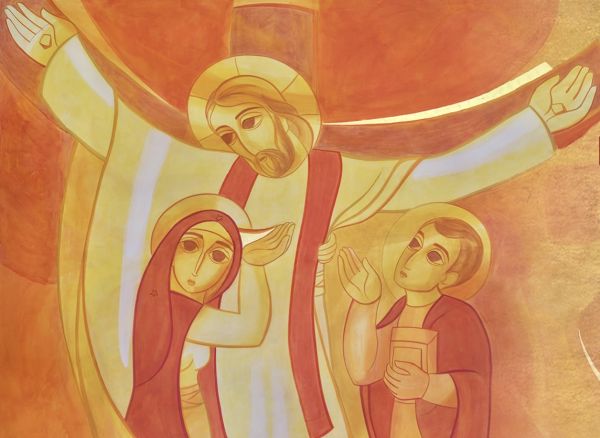The Passion of the Lord narrated by the evangelist John, brings to our attention the arrest and betrayal of the Son of God, his being brought before the high priests Annas and Caiaphas.
The latter uttered that crude expression:
«It is fitting that one man should die for the people» (Jn 18:14).
He is then led to Pilate's praetorium where he is handed over to the chief priests and guards to be crucified.
Drama of Love of our God for the man He loves!
Francis spent Good Friday uniting himself to the Lord's Passion, identifying with it.
Fasting, consistent with what Jesus says in the Gospel [when the Bridegroom is taken away from them, then they will fast] was certainly observed on that day by all the brothers and sisters of San Damiano.
In the Regola non bollata (1221), Francis expresses himself thus:
"The holy Lent, on the other hand, which begins on the Epiphany and lasts uninterruptedly for forty days, that which the Lord consecrated with his holy fast, those who voluntarily fast it may be blessed by the Lord, and those who do not want to may not be obliged. But the other, until the Lord's Resurrection, let them fast.
At other times they should not be obliged to fast, except on Fridays" (FF 84).
So too Clare and her sisters were faithful to the fast, especially the Mother:
"As long as he was in health, in fact, he fasted on bread and water during the Great Lent and the Lent of Saint Martin the bishop, enjoying only on Sundays a little wine, if he had any [...]" (FF 3194).
The sisters, concerned for her health, deplored with tears those daily deaths to which she subjected herself, until Francis ordered her not to let a day pass without eating at least an ounce and a half of bread.
The union with the Passion of Christ was lived first of all interiorly, but the body also mourned for the Spouse betrayed, vilified and killed for the salvation of many.
Francis mourned the Lord's Passion, filling the woods with tears and groans, while Clare, in the monastery, took part in Christ's martyrdom with her whole self in continuous prayer.
In the Vita seconda of Celano, regarding the last moments of the Poverello's life, the following is reported:
"He spent the few days remaining to him in a hymn of praise, inviting his beloved companions* to praise Christ with him. He then, as he was able, burst into this psalm:
"With my voice I cried out to the Lord, with my voice I asked the Lord for help".
She also invited all creatures to the praise of God, and with certain verses, which she had once composed, she exhorted them to divine love. Even death, terrible and hateful to all, exhorted praise, and going to her joyfully, invited her to be his guest:
'Welcome, my sister death!' " (FF 809).
And again:
"She then turned to the doctor*: 'Take courage, Brother Doctor, tell me that death is imminent: for me it will be the door of life!'
And to the brothers:
"When you see me reduced to the extreme, lay me down naked on the earth, as you saw me the day before yesterday, and after I am dead, let me lie like this for as long as it takes me to comfortably walk a mile".
Finally his hour came, and all the mysteries of Christ having been fulfilled in him, he happily flew away to God" (FF 810).
Clare, in love with her Lord and a little plant of the Seraphic Father, also spent Holy Thursday and the whole of Friday among the wounds of Christ:
"All that night and for the whole of the following day she remained as if absorbed, so out of herself that, with her eyes absent, always fixed on a single vision, she seemed to be nailed to Christ and completely insensible.
Return to her several times a familiar daughter, to see if by chance she desires anything, and always find her motionless in the same position' (FF 3217).
Love for Christ crucified was for Clare and Francis the source of every reason for living, of every gesture made in the sign of the cross, which blossomed on Easter morning.
* Brother Angelo and Brother Leo.
* The doctor: Bongiovanni, a native of Arezzo according to various sources, or perhaps of Assisi, son of Marangone Cristiano.
Good Friday «Passion of the Lord» (Jn 18:1-19:42)












